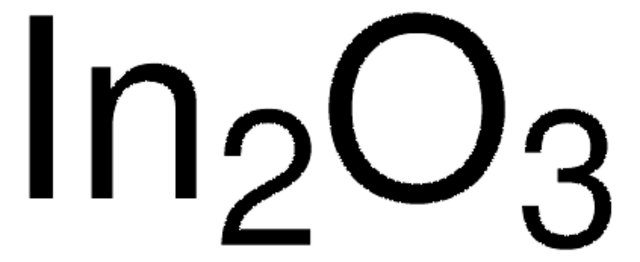639303
Indium tin oxide coated PET
surface resistivity 60 Ω/sq, L × W × thickness 1 ft × 1 ft × 5 mil, sheet
Synonym(s):
ITO-PET, Polyethylene terephthalate film, ITO coated
About This Item
Recommended Products
form
sheet
Quality Level
surface resistivity
60 Ω/sq
L × W × thickness
1 ft × 1 ft × 5 mil
transmittance
550 nm, >78%
SMILES string
O=[In]O[In]=O.O=[Sn]=O
InChI
1S/2In.5O.Sn
InChI key
LNNWKAUHKIHCKO-UHFFFAOYSA-N
Looking for similar products? Visit Product Comparison Guide
General description
Application
Micro mechanical properties of ITO-PET were investigated. Electrical resistance of ITO-PET increases in case of degradation. ITO-PET was used as an electrode in the electrochemical measurements in a study of biosensors composed of polymer brushes. ITO microelectrodes were studied as an “electronic tongue” for analyte recognition. The sheet resistance of ITO, after bending to a radius of 25 mm was investigated, for its use for flexible optical devices. Giant unilamellar vesicle (GUVs) were produced on ITO coated glass slides by drying droplets of the FhuA proteoliposomes.
Features and Benefits
Physical properties
Quantity
Storage Class Code
13 - Non Combustible Solids
WGK
WGK 3
Flash Point(F)
Not applicable
Flash Point(C)
Not applicable
Personal Protective Equipment
Choose from one of the most recent versions:
Already Own This Product?
Find documentation for the products that you have recently purchased in the Document Library.
Articles
In this article, we demonstrate that bis-styrylbenzene derivatives show promising characteristics for very low lasing thresholds and discuss the design considerations for organic lasing molecules.
Organic photovoltaics (OPVs) represent a low-cost, lightweight, and scalable alternative to conventional solar cells. While significant progress has been made in the development of conventional bulk heterojunction cells, new approaches are required to achieve the performance and stability necessary to enable commercially successful OPVs.
A transparent conductive electrode (TCE) is an essential component of various optoelectronic devices such as solar cells, liquid-crystal displays (LCD), light-emitting diodes (LED), and touch screens.
Recent progress in the area of solution-processed functional materials has led to the development of a variety of thin-film optoelectronic devices with significant promise in the industrial and consumer electronics fields.
Our team of scientists has experience in all areas of research including Life Science, Material Science, Chemical Synthesis, Chromatography, Analytical and many others.
Contact Technical Service




